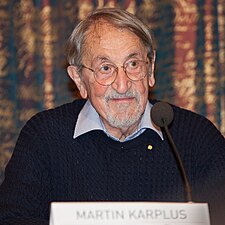Martin Karplus
| Martin Karplus | |
|---|---|

Nobel Prize Laureate Martin Karplus during press conference in Stockholm, December 2013
|
|
| Born |
March 15, 1930 Vienna, Austria |
| Citizenship | American, Austrian |
| Institutions | |
| Alma mater | |
| Thesis | A quantum-mechanical discussion of the bifluoride ion (1954) |
| Doctoral advisor | Linus Pauling |
| Notable awards |
|
|
Website chemistry |
|
Martin Karplus (born March 15, 1930) is an Austrian-born American theoretical chemist. He is the Theodore William Richards Professor of Chemistry, emeritus at Harvard University. He is also Director of the Biophysical Chemistry Laboratory, a joint laboratory between the French National Center for Scientific Research and the University of Strasbourg, France. Karplus received the 2013 Nobel Prize in Chemistry, together with Michael Levitt and Arieh Warshel, for "the development of multiscale models for complex chemical systems".
After earning an AB degree from Harvard College in 1950, Karplus pursued graduate studies at the California Institute of Technology. He completed his Ph.D. in 1953 under Nobel Laureate Linus Pauling. According to Pauling, Karplus "was [his] most brilliant student". He was an NSF Postdoctoral Fellow at the University of Oxford (1953–55) where he worked with Charles Coulson. Karplus taught at the University of Illinois and then Columbia University (1960–67) before moving to Harvard in 1967. He established a research group in Strasbourg, France, after two sabbatical visits between 1992 and 1995 in the NMR laboratory of Jean-François Lefèvre at Louis Pasteur University in Strasbourg.
Karplus has contributed to many fields in physical chemistry, including chemical dynamics, quantum chemistry, and most notably, molecular dynamics simulations of biological macromolecules. He has also been influential in nuclear magnetic resonance spectroscopy, particularly to the understanding of nuclear spin-spin coupling and electron spin resonance spectroscopy. The Karplus equation describing the correlation between coupling constants and dihedral angles in proton nuclear magnetic resonance spectroscopy is named after him.
...
Wikipedia
